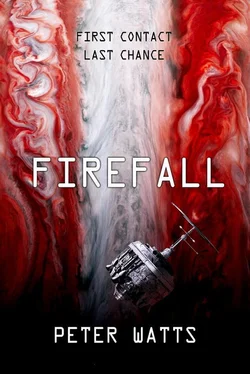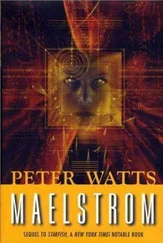“You’re on the moon,” I said.
Pause. “Close enough.”
“What are you—Dad, why are you telling me this? Isn’t this a security breach?”
“You’re going to get a call,” he told me.
“From who? Why?”
“They’re assembling a team. The kind of—people you deal with.” My father was too rational to dispute the contributions of the recons and hybrids in our midst, but he’d never been able to hide his mistrust of them.
“They need a synthesist,” he said.
“Isn’t it lucky you’ve got one in the family.”
Radio bounced back and forth. “This isn’t nepotism, Siri. I wanted very much for them to pick someone else.”
“Thanks for the vote of conf—”
But he’d seen it coming, and preempted me before my words could cross the distance: “It’s not a slap at your abilities and you know it. You’re simply the most qualified, and the work is vital.”
“So why—” I began, and stopped. He wouldn’t want to keep me away from some theoretical gig in a WestHem lab.
“What’s this about, Dad?”
“The Fireflies. They found something.”
“ What ?”
“A radio signal. From the Kuiper. We traced the bearing.”
“They’re talking ?”
“Not to us.” He cleared his throat. “It was something of a fluke that we even intercepted the transmission.”
“Who are they talking to?”
“We don’t know.”
“Friendly? Hostile?”
“Son, we don’t know . The encryption seems similar, but we can’t even be sure of that. All we have is the location.”
“So you’re sending a team.” You’re sending me. We’d never gone to the Kuiper before. It had been decades since we’d even sent robots. Not that we lacked the capacity. We just hadn’t bothered; everything we needed was so much closer to home. The Interplanetary Age had stagnated at the asteroids.
But now something lurked at the furthest edge of our backyard, calling into the void. Maybe it was talking to some other solar system. Maybe it was talking to something closer, something en route .
“It’s not the kind of situation we can safely ignore,” my father said.
“What about probes?”
“Of course. But we can’t wait for them to report back. The follow-up’s been fast-tracked; updates can be sent en route.”
He gave me a few extra seconds to digest that. When I still didn’t speak, he said, “You have to understand. Our only edge is that as far as we know, Burns-Caulfield doesn’t know we’re on to it. We have to get as much as we can in whatever window of opportunity that grants us.”
But Burns-Caulfield had hidden itself. Burns-Caulfield might not welcome a forced introduction.
“What if I refuse?”
The timelag seemed to say Mars .
“I know you, son. You won’t.”
“But if I did . If I’m the best qualified, if the job’s so vital…”
He didn’t have to answer. I didn’t have to ask. At these kind of stakes, mission-critical elements didn’t get the luxury of choice. I wouldn’t even have the childish satisfaction of holding my breath and refusing to play—the will to resist is no less mechanical than the urge to breathe. Both can be subverted with the right neurochemical keys.
“You killed my Kurzweill contract,” I realized.
“That’s the least of what we did.”
We let the vacuum between us speak for a while.
“If I could go back and undo the—the thing that made you what you are,” Dad said after a while, “I would. In a second.”
“Yeah.”
“I have to go. I just wanted to give you the heads-up.”
“Yeah. Thanks.”
“I love you, son.”
Where are you? Are you coming back?
“Thanks,” I said again. “That’s good to know.”
* * *
This is what my father could not unmake. This is what I am:
I am the bridge between the bleeding edge and the dead center. I stand between the Wizard of Oz and the man behind the curtain.
I am the curtain.
I am not an entirely new breed. My roots reach back to the dawn of civilization but those precursors served a different function, a less honorable one. They only greased the wheels of social stability; they would sugarcoat unpleasant truths, or inflate imaginary bogeymen for political expedience. They were vital enough in their way. Not even the most heavily-armed police state can exert brute force on all of its citizens all of the time. Meme management is so much subtler; the rose-tinted refraction of perceived reality, the contagious fear of threatening alternatives. There have always been those tasked with the rotation of informational topologies, but throughout most of history they had little to do with increasing its clarity .
The new Millennium changed all that. We’ve surpassed ourselves now, we’re exploring terrain beyond the limits of merely human understanding. Sometimes its contours, even in conventional space, are just too intricate for our brains to track; other times its very axes extend into dimensions inconceivable to minds built to fuck and fight on some prehistoric grassland. So many things constrain us, from so many directions. The most altruistic and sustainable philosophies fail before the brute brain-stem imperative of self-interest. Subtle and elegant equations predict the behavior of the quantum world, but none can explain it. After four thousand years we can’t even prove that reality exists beyond the mind of the first-person dreamer. We have such need of intellects greater than our own.
But we’re not very good at building them. The forced matings of minds and electrons succeed and fail with equal spectacle. Our hybrids become as brilliant as savants, and as autistic. We graft people to prosthetics, make their overloaded motor strips juggle meat and machinery, and shake our heads when their fingers twitch and their tongues stutter. Computers bootstrap their own offspring, grow so wise and incomprehensible that their communiqués assume the hallmarks of dementia: unfocused and irrelevant to the barely-intelligent creatures left behind.
And when your surpassing creations find the answers you asked for, you can’t understand their analysis and you can’t verify their answers. You have to take their word on faith—
—Or you use information theory to flatten it for you, to squash the tesseract into two dimensions and the Klein bottle into three, to simplify reality and pray to whatever Gods survived the millennium that your honorable twisting of the truth hasn’t ruptured any of its load-bearing pylons. You hire people like me; the crossbred progeny of profilers and proof assistants and information theorists.
In formal settings you’d call me Synthesist. On the street you call me jargonaut or poppy . If you’re one of those savants whose hard-won truths are being bastardized and lobotomized for powerful know-nothings interested only in market share, you might call me a mole or a chaperone .
If you’re Isaac Szpindel you’d call me commissar , and while the jibe would be a friendly one, it would also be more than that.
I’ve never convinced myself that we made the right choice. I can cite the usual justifications in my sleep, talk endlessly about the rotational topology of information and the irrelevance of semantic comprehension. But after all the words, I’m still not sure. I don’t know if anyone else is, either. Maybe it’s just some grand consensual con, marks and players all in league. We won’t admit that our creations are beyond us; they may speak in tongues, but our priests can read those signs. Gods leave their algorithms carved into the mountainside but it’s just li’l ol’ me bringing the tablets down to the masses, and I don’t threaten anyone.
Читать дальше








